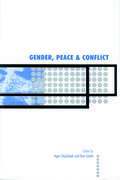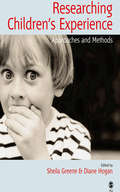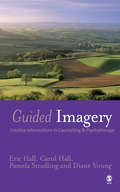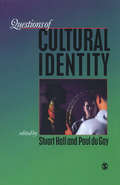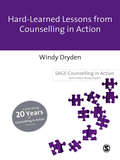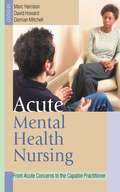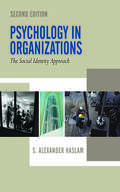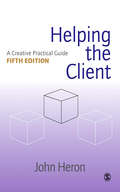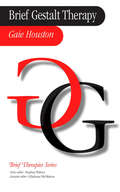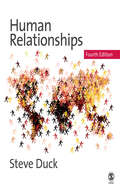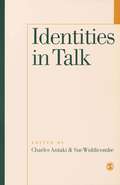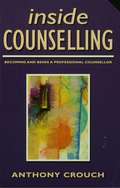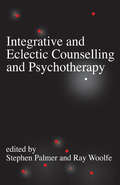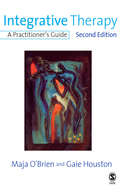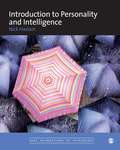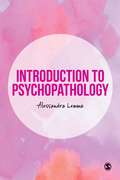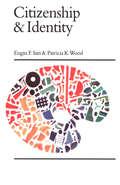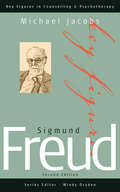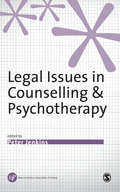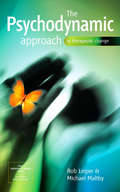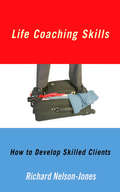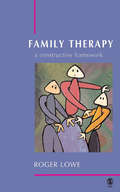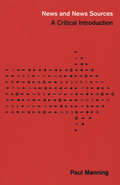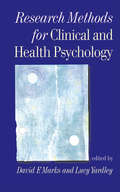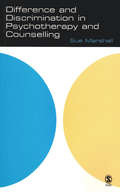- Table View
- List View
Gender, Peace and Conflict (International Peace Research Institute, Oslo (PRIO))
by Dan Smith Inger Skjelsbæk- What impact does gender difference make to political decision-making? - Will the political empowerment of women contribute to a more peaceful world? The role of gender has been increasingly recognized as central to the study and analysis of the traditionally male domains of war and international relations. This book explores the key role of gender in peace research, conflict resolution and international politics. Rather than simply 'add gender' the aim is to transcend different disciplinary boundaries and conceptual approaches to provide a more integrated basis for future study. To this end it uniquely combines theoretical chapters alongside empirical case studies to demonstrate the importance of a gender perspective to both theory and practice in conflict resolution and peace research. The theoretical chapters explore the gender relationship and engage with the many stereotypical dichotomies like femininity and peace and masculinity and war. The case study chapters (drawing on examples from South America, South Asia and Europe, including former Yugoslavia) move beyond theoretical critique to focus on issues like sexual violence in war, the role of women in military groups and peacekeeping operations and the impact of a 'critical mass' of women in political decision-making. Gender, Peace and Conflict will provide an invaluable survey and new insights to a central area of contemporary research. It will be essential reading for academics, students and practitioners across peace studies, conflict resolution and international politics.
Researching Children's Experience: Approaches and Methods
by Dr Diane Hogan Dr Sheila Greene`Strongly recommended as it provides a very useful overview of a range of methods, mainly textual, for exploring children's experiences. These accounts are placed well in the broader conceptual frameworks concerning both methodologies and ethical considerations' - Educational Review How should the researcher approach the sensitive subject of the child? What are the ethical issues involved in researching children's experiences? In essays written by a collection of key, international authors, Researching Children's Experience addresses these questions, and examines up-to-date methodological and conceptual approaches to researching children. This book is a practical, comprehensive and interdisciplinary guide for advanced students and researchers, exploring a range of studies, and the theoretical and ethical motivations behind them. The book is divided into three coherent sections: - Conceptual, methodological and ethical issues in researching children's experiences. - Methods for conducting research with children. - The generation and analysis of text. Researching Children's Experience provides examples of how researchers from a variety of social science perspectives have set about carrying out research into children's experience. Useful to students embarking on a research project, and to experienced researchers wishing to explore new methods, Greene and Hogan's book is an essential addition to anyone doing research on children. It will be especially useful to those in developmental psychology, education, nursing and other disciplines interested in studying children's experience.
Guided Imagery: Creative Interventions in Counselling & Psychotherapy
by Eric Hall Diane Young Carol Hall Pamela Stradling`I would recommend reading this enjoyable book in which the authors convey practical, creative and compassionate authenticity throughout. I think it will appeal to experienced counsellors, psychotherapists and arts therapists. It will also be a valuable resource to students' - Therapy Today `Hall et al bring many years of practice and academic experience to their material. The book is accessible in its style and makes extensive use of interesting case histories' - Eisteach (Journal for the Irish Association of Counselling and Psychotherapy) `fascinating scenarios.... a useful book to have - I have really enjoyed reading it' - International Arts Therapies Journal (Online) Guided Imagery is a unique, practical guide to using imagery in one-to-one therapeutic work with clients. Through numerous examples drawn from their own experience, the authors show how the techniques involved can be integrated into everyday practice. The authors describe the different processes of using guided imagery and working from a script and show how drawing can be used to augment imagery work. In addition to planned strategies for using imagery, they also show how images which arise spontaneously during sessions can be harnessed and used to enhance the therapeutic process. The practical strategies and techniques outlined in the book are examined in the context of a variety of theoretical frameworks (the person-centred approach, gestalt, existentialism and psychosynthesis) and research findings. Potential pitfalls and ethical considerations are also explored, making Guided Imagery a useful resource for practitioners and an ideal text for use on counselling and psychotherapy training courses.
Questions of Cultural Identity: SAGE Publications
by Paul Du Gay Stuart HallWhy and how do contemporary questions of culture so readily become highly charged questions of identity? The question of cultural identity lies at the heart of current debates in cultural studies and social theory. At issue is whether those identities which defined the social and cultural world of modern societies for so long - distinctive identities of gender, sexuality, race, class and nationality - are in decline, giving rise to new forms of identification and fragmenting the modern individual as a unified subject. Questions of Cultural Identity offers a wide-ranging exploration of this issue. Stuart Hall firstly outlines the reasons why the question of identity is so compelling and yet so problematic. The cast of outstanding contributors then interrogate different dimensions of the crisis of identity; in so doing, they provide both theoretical and substantive insights into different approaches to understanding identity.
Hard-Earned Lessons from Counselling in Action (Counselling in Action #15)
by Windy DrydenSeminars by Professor Windy Dryden. See the man live and in action. To find out more and to book your place go to www.cityminds.com ________________________________________ SAGE celebrated the 20th Anniversary of the Counselling in Action in November 2008. To view the video - click here ----------------------------------------------------------- `This is a very honest book and should be essential reading for anyone beginning training as a counsellor. It will also be useful for experienced therapists to stimulate reflections on their own practice... to examine their work and to learn from errors. It is refreshing to witness the honesty and openness of the writers - especially so in the present culture, where many therapists set themselves up as flawless experts... I would recommend this book... it provides an informed and open discussion on the problems encountered by therapists' - Clinical Psychology Forum Counsellors often struggle in their work with clients, convinced that their more experienced colleagues have not encountered similar problems and worries. In this volume, some of Britain's leading counsellors give the lie to this myth. Writing openly and frankly, they share the painful lessons they have learned over the course of their careers as practitioners. The contributors' combined experience proves that all counsellors, no matter how expert or well-known, have made mistakes, or faced challenges, and from them have had to learn aspects about the process of counselling - the hard way. The five `lessons' from each contributor are placed in the context of the counsellor's own particular circumstances, and a concluding section in each chapter links the connecting themes that emerged throughout their learning process.
Acute Mental Health Nursing: From Acute Concerns to the Capable Practitioner
by Damian Mitchell Dr David Howard Marc Harrison'This is an exciting and timely contribution to the resources available for policy makers, and practitioners wishing to improve standards and health and social outcomes in inpatient care within the context of community oriented comprehensive care for people with mental illness' - Professor Rachel Jenkins, Director, WHO Collaborating Centre, Institute of Psychiatry, Kings College London 'This book is a valuable addition to the growing literature on acute care and should provide great encouragement to the frontline staff in this area... By bringing together this range of excellent material the editors have also been able to produce a book which addresses the most thorny problems which face most frontline staff for much of their working day' - From the Foreword by Professor Kevin Gournay, CBE Health Services Research Department, Institute of Psychiatry 'Inpatient mental health care has had a rough ride in recent years. Its shortcomings have been highlighted, while policy emphasis and cash have been directed to community services. This very welcome book reminds us that inpatient care and treatment are an essential element in the spectrum of mental health services and shows how they can be re-thought and fine-tuned in ethos, practice and training, for the benefit of service-users, staff and the wider community. It deserves a wide readership' - John Bowis MEP (former Health Minister for Mental Health) 'By concentrating on describing the skills of practitioners the editors and authors of Acute Mental Health Nursing have developed a unique resource for both students and practitioners of acute inpatient care. Their no nonsense evidence- based approach will be an invaluable aid to developing practical responses to this important though challenging area of mental health practice' - Richard Bradshaw, Director of Nursing Prison Health Department of Health England formerly Professional Office Mental Health and Learning Disabilities Nursing UKCC 'Comprehensively tackles a range of key issues that the student or advanced practitioner in acute mental health nursing will face... I recommend this book, which will provide a useful resource for anyone interested in this important area of nursing' - Journal of Community Nursing Recent mental health policy has focused on developing community-based services, while the reality remains that patients experiencing acute episodes of illness are mainly cared for in hospital. Acute Mental Health Nursing has been developed as a guide to the core knowledge and skills required for working in inpatient settings. Bringing together a vastly experienced and multi-professional team of contributors, the book covers core areas of practice including: · assessment · risk management · case management and integrated care pathways · observation · cognitive behavioural therapy · psycho-social interventions · medication management · user involvement · social inclusion · measurement of health and social functioning. Drawing on the latest developments in policy and planning, Acute Mental Health Nursing addresses issues which are specific to working in inpatient settings. It has been designed for use in training and is also an excellent source of reference for use in practice.
Psychology in Organizations
by S Alexander HaslamAlex Haslam has thoroughly revised and updated his ground-breaking original text with this new edition. While still retaining the highly readable and engaging style of the best-selling first edition, he presents extensive reviews and critiques of major topics in organizational psychology - including leadership, motivation, communication, decision making, negotiation, power, productivity and collective action - but with much more besides. Key features of this 2nd Edition: · An entirely new chapter on organizational stress which deals with highly topical issues of stress appraisal, social support, coping and burnout. · New, wider textbook format and design making the entire book much more accessible for students. · Wide range of pedagogical features included - suggestions for further reading included at the end of each chapter; comprehensive glossaries of social identity, social psychological and organizational terms.
Helping the Client: A Creative Practical Guide
by John Heron`Those who claim to have counselling among their skills should read this book and reflect on their own practice. This would in itself be a growth experience for many' - British Journal of Psychiatry `The author rewards one with a wealth of interventions which are, as the subtitle suggests, very creative but also very practical' - Nursing Times Helping the Client is the bestselling text which has long been used as the basis of interpersonal skills training in a wide range of professions from medicine to management. Based on John Heron's well-known six category model, the book presents different forms of helping behaviour which can be adopted by any practitioner working face-to-face with a client. Drawing on his many years of experience as a therapist, consultant and teacher, the author explores the contexts and issues associated with these different forms of helping and, for each, describes a wide range of practical interventions for the practitioner to use. He examines the objectives of helping, states of personhood, the many ways in which helping can degenerate, the preparation and training of the practitioner, and examples of how the interventions can be used by different occupational groups. Helping the Client is the Fifth Edition of the book originally entitled Six Category Intervention Analysis. Revised and enlarged throughout, with a new chapter on co-working, the book remains essential reading for the development of interpersonal skills, in counselling, management, health care, social work, youth and community work, education, and many other professions.
Brief Gestalt Therapy (Brief Therapies series)
by Ms Gaie Houston`Anybody with the slightest interest in brief therapy should read this book. Now that the initial controversy over brief therapy has begun to subside it is great to see how brief therapy works in practice. Gaie Houston's book is part of a series published by SAGE which sets out to do this - and hers is particularly illuminating and accessible. As she points out Gestalt is better equipped than many mainstream therapies to be applied to situations with extreme time constraints because it is both flexible and it acknowledges the part that can be played by other therapies. But what propels Houston's book out of the hum drum - or indeed the defensive (or offensive) diatribes about short therapy which have appeared over the past few years - is her vivid accounts of real-life sessions, both one to one and group, which punctuate the text' - Amazon Review Brief Gestalt Therapy demonstrates how the Gestalt approach can be used effectively in brief interventions with clients. Gestalt's distinctively integrative nature and emphasis on a highly co-operative working alliance, make it particularly suited to brief work. The book sets out the basic theory and principles of Gestalt and looks at each phase of the therapeutic process from initial assessment through the beginning and middle stages to the ending of the work. It presents clear, practical strategies for therapists to follow and in particular examines: } aspects of Gestalt which are especially relevant to brief work -} the elements of successful therapy -} ways of improving skills. Brief Gestalt Therapy includes vignettes and detailed case studies which bring the theory alive. It will contribute much to both existing literature on Gestalt therapy and also brief therapy, and will be invaluable to trainee and practising Gestalt therapists.
Human Relationships (Relationships Ser.)
by Steve DuckThe Fourth Edition of this highly successful textbook provides a unique and comprehensive introduction to the study and understanding of human relationships. Fresh insights from family studies, developmental psychology, occupational and organizational psychology also combine to bring new perspectives to this thorough survey of the field. Thoroughly updated, with new chapters on: relating difficulty; "small media" technology and relationships, and practical applications, the Fourth Edition offers a fully up-to-date and authoritative review of the field.
Identities in Talk
by Charles Antaki Sue Widdicombe`Identity' attracts some of social science's liveliest and most passionate debates. Theory abounds on matters as disparate as nationhood, ethnicity, gender politics and culture. However, there is considerably less investigation into how such identity issues appear in the fine grain of everyday life. This book gathers together, in a collection of chapters drawing on ethnomethodology and conversation analysis, arguments which show that identities are constructed `live' in the actual exchange of talk. By closely examining tapes and transcripts of real social interactions from a wide range of situations, the volume explores just how it is that a person can be ascribed to a category and what features about that category are consequential for the interaction.
Inside Counselling: Becoming and Being a Professional Counsellor
by Anthony Crouch`Anthony Crouch examines the internal and subjective reality of being a counsellor. Using a series of vignettes, rather than case studies, Crouch builds in all participant perspectives, counsellor, client and supervisor. . . [the book] proves to be eminently readable, like a good novel. And like a good novel, as opposed to merely a "good read", it takes the reader into the world of its characters so that we might understand them. From the outset, Crouch asserts that the effective counsellor is one who can enter the intimate subjectivity of the client and use that reality as a catalyst for change and growth. By the same token the counsellor should grow through that interaction. The book also contains a series of challenging personal development exercises which the author invites the reader to undertake' - Counselling and Psychotherapy, The Journal of the British Association for Counselling and Psychotherapy This innovative and creative book explores the experience of becoming and being a counsellor, and engaging in the therapeutic process. The book enters the internal, subjective world of counselling through its characters: students, counsellors, clients, supervisors and the author himself. It weaves together their perspectives and uses `talk' as its main medium - the talk of counselling and supervision sessions, training groups, workshops and students' journals. In so doing, the book breaks away from traditional methods and conventions to present complex theories, difficult concepts and serious information in an engaging, focused and manageable way. The book encourages readers to think subjectively, to question theories that come solely from outside, and to stay with and use their internal world as the main focus of counselling work. It also provides personal development exercises to help readers access long-forgotten feelings.
Integrative and Eclectic Counselling and Psychotherapy
by Stephen Palmer Ray WoolfeStephen Palmer is Joint award winner of the Annual Counselling Psychology Award for outstanding professional and scientific contribution to Counselling Psychology in Britain for 2000. `The editors' support for the integrative project is clear, but the book will hold its own with the sceptics too. I recommend it' - Counselling at Work This innovative and timely book examines the issues and ideas surrounding integration and eclecticism in a therapeutic context, and provides a detailed account of a wide range of approaches in use. Following an exploration of the origins of integrative and eclectic processes, 10 approaches are explained in detail. Chapters on each approach: describe its central concepts, assumptions and therapeutic goals; outline its view of how psychological disturbance is acquired, perpetuated and resolved; examine how the theory relates to practice - including examples of typical sessions and case studies; and consider which clients might benefit. Further chapters explore the implications of using integrative and eclectic approaches for training, supervision, for working in a time-limited context and from a multicultural perspective.
Integrative Therapy: A Practitioner's Guide
by Ms Gaie Houston Dr Maja O'Brien`The book is comprehensive, and extensively researched and referenced. ....[The] last chapter contains some excellent training resources for trainers of counsellors/psychotherapists. I would therefore endorse it as a useful textbook, especially as there is an excellent in-depth example of an assessment form, and guidance on how this can be used for trainees. These were useful revision points to me as an experienced counsellor' - The Independent Practitioner `The book would be useful to practitioners who want to start thinking 'outside the box' of a particular orientation. It is also aimed at students and trainers - the last 40 pages in particular are full of practical training exercises. Overall, I would recommend it as a well-reasoned argument for therapy to be rooted in an integrative base' - Therapy Today `Throughout the book it is assumed that we can learn from each other and that we need to, whatever orientation we were trained in, in the service of the client. I find this pragmatic approach open and refreshing in a period when some of us have polarised around the 'what works best' debate. Both authors are experienced practitioners and trainers and their commitment to integrative counselling and psychotherapy shines through' - AUCC Journal Integration rather than a single theory has become accepted and widely recommended as a way forward in psychotherapy and counselling. Integrative Therapy, Second Edition, a timely and innovative guide for practitioners, is based on the view that training and practice methods should be evaluated for their usefulness to the client instead of their adherence to a particular model. Drawing from research on therapy process and outcome, and on human development respectively, the authors highlight striking similarities between the change processes involved in these two areas of study. The findings provide a basis for an adaptable framework for integrative practice. The authors pinpoint what is common as well as what is different in various approaches, using case illustrations to make comparisons throughout between the three major models: psychodynamic, humanistic-existential and cognitive-behavioural. What emerges is the central importance of the therapeutic relationship in the process of change - 'how to be with clients' as opposed to 'what to do'. Fully revised and updated, this Second Edition includes new material on neuroscience and practitioner-oriented research methodology showing how the processes of doing research and doing therapy have many things in common. The book aims to cultivate a spirit of willingness amongst therapists trained in one model to learn from colleagues trained in others. It also features exercises to support its use on courses and will thus be invaluable to trainees of counselling, psychotherapy and counselling psychology. Maja O'Brien is a chartered counselling psychologist and psychotherapist, supervisor and trainer based in Oxford and a Principal Lecturer on the Doctorate in Psychotherapy by Professional Studies run jointly by the Metanoia Institute and Middlesex University. Gaie Houston is a writer, UKCP-registered psychotherapist and senior lecturer at The Gestalt Centre, London.
Introduction to Personality and Intelligence
by Nick Haslam`The inclusion of the chapter on psychobiography and life narratives is also an innovative inclusion, as this chapter encourages readers to integrate all the previous material into their analysis of famous people, a technique that will without a doubt have students captivated. . . an excellent introductory text' - Australian Journal of Educational and Developmental Psychology `There is a wonderful balance and clarity in coverage of complex and contentious issues. Throughout, the tone is amiable…the writing engaging and clear" - Dr Robbie Sutton, University of Kent Nick Haslam's highly-anticipated new text is a thoroughly engaging introduction to the psychology of personality and, crucially, intelligence. Fully tailored to the British Psychological Society's guidelines regarding the teaching of individual differences, Introduction to Personality and Intelligence provides the perfect package for any first or second year undergraduate psychology student taking a course in this fascinating subject. Key features: - coverage of all core topics for a personality course - a whole section devoted to intelligence - includes mental disorders and cognitive approaches - focuses on major theoretical issues - presents a good range of applied theory chapters - packed with pedagogical features including: key concept boxes and a full glossary, illustrative case studies, and annotated further reading The author's writing style, use of pedagogy and incorporation of the latest empirical research findings makes Introduction to Personality and Intelligence an essential textbook for all psychology students on a personality or individual differences course. (The author's website can be accessed here)
Introduction to Psychopathology
by Alessandra LemmaI was most impressed by the author's thoroughness in writing this book. She seems to leave no stone uncovered. . . [this is] a work which should become a necessity for all counsellors, counselling psychologists, psychiatric nurses and psychotherapists. . . This is a book to which I will make reference time and time again, and one which will occupy a prominent place in my library' - Counselling, The Journal of the British Association for Counselling `An invaluable handbook for students of psychotherapy and a good reference for established therapists. . . I recommend that all therapists have a copy of this book on their shelf' - Psychology, Health & Medicine Assessment and referral skills are essential for counsellors and psychotherapists. Practitioners need to have an understanding of the clinical manifestations of severe emotional distress. They must, for example, be able to recognize when clients are a suicide risk or when they are suffering from a psychotic episode. This lively textbook provides a clear overview of the issues involved in our understanding of psychopathology and offers guidelines on appropriate interventions. Alessandra Lemma explores a range of key topics, covering how psychiatric diagnoses and classifications are arrived at, and the issues that can arise when working in conjunction with other mental health practitioners, such as psychiatrists. She addresses the needs of practitioners in relation to some of the more common forms of mental distress - depression, anxiety and eating problems - as well as some of the more controversial diagnoses, such as schizophrenia and `borderline personality disorder'. The book concludes with a discussion of alternatives to mainstream approaches, including those which seek to deconstruct the concept of psychopathology. Introduction to Psychopathology offers a framework for assessing clients which incorporates a broad range of models and approaches, and which takes into account psychological, social and biological factors. It will be an invaluable resource for students of counselling, counselling psychology, psychotherapy and clinical psychology.
Citizenship and Identity (Politics and Culture series)
by Engin F. Isin Patricia K. WoodThrough a detailed introductory discussion of the relation between the civil and the political, and between recognition and representation, this book provides a comprehensive vocabulary for understanding citizenship. It uses the work of T H Marshall to frame the critical interrogation of how ethnic, technological, ecological, cosmopolitan, sexual and cultural rights relate to citizenship. The authors show how the civil, political and social meanings of citizenship have been redefined by postmodernization and globalization.
Sigmund Freud (Key Figures in Counselling and Psychotherapy)
by Mr Michael JacobsPraise for the First Edition: `This is the Second Edition of a book first published in 1992 as part of the Key Figures in Counselling and Psychotherapy series edited by Windy Dryden. It has proved a successful introduction to the life and work of Sigmund Freud: in this present edition Michael Jacobs takes the opportunity of the new translation of Freud now appearing to offer more suggestions about reading, particularly the papers of technique available through Virago's 2001 publication of the Standard Edition' - The Journal of Analytical Psychology In refreshing contrast to most other books on Sigmund Freud, this is a highly accessible account of his life and ideas, which focuses on the relevance of Freud's work for contemporary approaches to counselling and psychotherapy. The book provides an overview which is based firmly on Freud's own writings, but which goes far beyond a recapitulation of the existing literature, to offer fresh insights and some surprises, both about Freud the man and his theories. Written by bestselling author, Michael Jacobs and now fully updated for its Second Edition, Sigmund Freud presents and responds to the criticisms that Freud's work attracted, and charts his continuing influence in the 21st century. This is highly recommended reading for those training in counselling and psychotherapy as well as those studying Freud in other contexts. Michael Jacobs is a retired lecturer in Counselling Studies and bestselling author whose publications include (in the same series), D W Winicott (SAGE, 1995) and Psychodynamic Counselling in Action, Second Edition (SAGE, 1999).
Legal Issues in Counselling & Psychotherapy (Ethics in Practice Series)
by Mr Peter Jenkins`This is an excellent book. It builds well on Peter Jenkins' admirable earlier contribution to our knowledge of the many legal matters that are of vital concern to counsellors (Counselling, Psychotherapy and the Law, SAGE 1997) It is mY intention, as a counsellor and lecturer to make Peter Jenkins' new book required reading for all our students. Indeed I would go as far to say that all counsellors, not matter how experienced they consider themselves, should consider this book as essential reading. As the advert says, "don't leave home without one!" - Norman Claringbull, Counselling at Work `This is good value for trainees and experienced practitioners alike, provoking reflection and providing a useful reference source' - Sally Scott, Healthcare Counselling and Psychotherapy Journal Counsellors and psychotherapists are increasingly seeing the impact of legal issues on their practice and yet many feel under-prepared for the challenges they have to face. Legal Issues in Counselling & Psychotherapy is a much-needed source of advice and reference which examines the rapidly growing range of situations in which therapists find themselves in contact with the law - in their everyday practice, in specialist work, or when facing a legal case against them. The first part covers the current legal context of therapeutic work including confidentiality, contracts, data protection and court reports. Chapters include: defining work by leading writers from the therapeutic and legal worlds, as well as an illuminating account by a client who brought a successful case against her therapist. Some areas of therapeutic work are particularly circumscribed by legal issues and the second part examines the specific implications for therapists in relation to: - working with survivors of sexual abuse -working in legal settings -false memory -the Human Rights Act. Looking to the future, the book also examines the implications of professional regulation for all counsellors and psychotherapists. The need for counsellors and psychotherapists to be well informed about the law is rapidly growing. Legal Issues in Counselling & Psychotherapy therefore provides access to essential information which will be of great value to trainees, practitioners and supervisors.
The Psychodynamic Approach to Therapeutic Change (SAGE Therapeutic Change Series)
by Rob Leiper Michael Maltby`It is well written and well organised and I'm sure it will be of help and interest to researchers and practitioners concerned with the therapeutic action of psychodynamic treatment' - Penelope Waite, Nurturing Potential Change is the central purpose of all counselling and psychotherapy, but how it is conceptualized and worked with varies according to the theoretical approach being used. The Psychodynamic Approach to Therapeutic Change explores the nature of psychological change from the psychodynamic perspective and describes the process through which clients can be helped to come to terms with painful experiences and develop new ways of relating. In the first part of the book, Rob Leiper and Michael Maltby look at therapeutic change in relation to psychological health and maturity. They explore what motivates people to change and also why resistance occurs. The main part of the book outlines the collaborative process that clients and therapist work through to bring about change and highlights the role of the therapist in: ] creating the conditions for clients to express their thoughts, feelings and memories ] developing clients' awareness and understanding of their psychological processes, and ] providing `containment' for the client's psychological projections. The final part of the book sets personal therapeutic change in a wider social context, linking individual change with community and organisational development. Combining core psychodynamic concepts with contemporary thinking, The Psychodynamic Approach to Therapeutic Change provides a lively and up-to-date integration of ideas on the change process which will be of great value to trainees and practicing counsellors and psychotherapists.
Life Coaching Skills: How to Develop Skilled Clients
by Richard Nelson-Jones`Life Coaching Skills by Dr Richard Nelson-Jones is an excellent introduction to this rapidly expanding field of work. I can thoroughly recommend this book for both experienced and neophyte coaches. Practitioners from other professions and the layperson may also find the skills useful' - Professor Stephen Palmer, Coaching Psychology Unit, City University `This book provides a wealth of information and expertise founded on tried and tested interventions and cannot fail to improve the skill level of existing coaches as well as those entering the Life Coaching arena' - Gladeana McMahon, Head of Coaching Fairplace plc, Co-Director, Centre for Coaching Life coaching is a rapidly growing area with more and more people seeking help to lead satisfying and successful lives. Life Coaching Skills provides a practical introduction to the skills needed to be an effective life coach and incorporates a wide range of practical activities for coaches to use to help their clients develop self-coaching skills. Written by leading skills expert, Richard Nelson-Jones, the book presents a four stage life coaching model based around the core concepts of relating, understanding, changing and client self-coaching. It explores the central skills of coaching used within the model including: establishing the coaching relationship; assessment and goal setting; presentation; demonstration, and consolidation. The main focus of the book is on one-to-one life coaching particularly concerning relationship, work, and health issues. The specific skills needed for working with groups are also discussed and ethical issues and dilemmas related to coaching are explored. Life Coaching Skills is ideal for anyone interested in becoming a life coach and for use in training.
Family Therapy: A Constructive Framework
by Dr Roger Lowe`I liked this book. Though I am not a family therapist, like most mental health nurses I try to bear in mind the family relationships of individuals I am working with. This is an enlightening text which not only offer a framework with which we can better understand the severe psychopathologies seen in forensic work, but also gives examples of how it may be used therapeutically' - Mental Health Practice `I think this is an important book that crystallises complex theory into a user-friendly model, using case material and discussions from the therapeutic community. A must have for counsellors working with families, this will form part of the recommended reading on the Family Counselling course' - Barbara McKay, Relate Head of Training, Relate News `The book provides a good overview of a number of recent approaches to working with families as well as how the author thinks about them' - Stephen Bray, Nurturing Potential `Roger Lowe achieves the almost impossible task of bringing together various theories, techniques and case examples in clear and accessible ways. Readers of all disciplines, from front-line hard-pressed practitioners to students on therapy and social work courses, will be grateful for the simple and, above all, useful way he tackles the burning questions that arise in working with the family group. Highly recommended!' - Harvey Ratner, Brief Therapy Practice, London Family Therapy introduces practitioners to the principles of using a constructive and collaborative approach with families. The approach builds on a strengths-based philosophy and focuses on enhancing family resilience and competence in a way that is both time-efficient and comprehensive. It brings together skills from contemporary models such as solution-focused, narrative and conversational therapies and adapts them to the specific challenges of working with family relationships. It is the first book to systematically integrate these influential approaches and apply them to family work. Setting out a clear framework for practice, Roger Lowe describes the key tasks for the therapist as: · hosting meetings · negotiating concerns, and · evoking family members' personal and relationship resources. The framework is designed to be clear but flexible, and to allow practitioners to adapt it to their own situational needs. For example, it suggests ways for practitioners to selectively 'borrow' from other therapeutic models while retaining a constructive orientation. It also explores ways in which therapists can use their 'inner' conversation during a session as a tool to overcome obstacles to the therapeutic process. Although there is a common belief that the approach is only suited to brief interventions, the author also describes ways of working constructively over a longer period of time. Throughout the book, case studies are included to show how the constructive framework is used in practice and to highlight a range of challenging situations that may be encountered during family therapy. Roger Lowe's book provides a refreshingly different approach to working with families, which chimes with the growing interest in constructive approaches. It is written for trainees and for practitioners who are interested in developing their skills in this collaborative and optimistic approach.
News and News Sources: A Critical Introduction (Mass Ser.)
by Paul ManningNews and News Sources offers a fresh introduction to the sociology of news. It is often suggested that the powerful dominate news agendas. Increasingly however, less powerful groups are employing sophisticated media strategies and new communication technologies to get their message across. The implications of this development are unclear. Do these developments herald a `democratisation' of news arenas, or will they enable the powerful further strengthen their control over the flow of information to the public domain? News and News Sources: reviews new research in the rapidly expanding field of political communication, drawing upon material from Britain, Europe and the USA; provides a clear introduction to the processes of news production and the implications of the rise in global electronic news communication; and assesses the various theoretical frameworks available for analysing these developments including fuctionalism, pluralism, Marxism, political economy, hegemony theory, discourse theory and postmodernism.
Research Methods for Clinical and Health Psychology
by David F. Marks Dr Lucy Yardley`If you are teaching postgraduate research methods courses, including those aimed at a mixture of psychologists and other health professionals, this book is worth considering as a core text' - John Hegarty, THES This textbook offers an excellent introduction to the variety of research methods used within the fields of clinical and health psychology. The book provides a detailed, yet concise, explanation of both qualitative and quantitative approaches and draws upon case-study examples to illustrate how these can be used in a variety of health-care settings, with special relevance to clinical disorders, disease prevention and health promotion. Key features of the book include: - A clear and concise narrative - Real-life case studies and examples drawn from clinical practice. - Revision questions in each chapter - Boxes, diagrams and tables to highlight key points - Chapter outlines, summaries and a glossary of useful terms to help students and researchers with independent study and learning. Research Methods for Clinical and Health Psychology fulfils the demand for a textbook explaining how qualitative and quantitative methods can be used explicitly in a health psychology context. It will be invaluable reading for clinical and health psychology students, trainees and practitioners, as well as those in nursing, medical and other healthcare departments taking an advanced psychology option.
Difference and Discrimination in Psychotherapy and Counselling (The School of Psychotherapy & Counselling)
by Dr Sue Marshall'Prejudice is, for good or ill, a part of our nature. It is instilled in us from birth onwards. All we can hope to do is to combat it, and the first tool in our armoury must be that of awareness. Without this, it is very difficult, perhaps impossible, for the psychotherapist or counsellor to explore how it might be influencing the psychotherapy relationship. Sue Marshall has, in this book, performed a valuable task in that direction, and has done in it very cogently in a most difficult area. I applaud her' - Joe Sinclair, Nurturing Potential Difference, prejudice and discrimination are issues which all counsellors and psychotherapists need to address as part of their personal and professional development. Designed to support training on these complex issues, Difference & Discrimination in Counselling & Psychotherapy helps therapists understand the experience of discrimination, as well as explore their own - often unconscious - attitudes to others, based on gender, sexuality, race, culture or mental health. For most therapists an attitude of acceptance and non-judgmentalism is fundamental to their view of practice. However, in seeking to be non-judgmental, therapists may run the risk of concealing their own prejudices. It is only by facing up to these attitudes and exploring them that therapists are able to fully relate to their clients and help them effectively. Synthesising sociological knowledge with her experience of a practitioner, Sue Marshall powerfully demonstrates both the importance and the practicalities of developing awareness about difference. Difference & Discrimination in Counselling & Psychotherapy offers a straightforward approach to some of the most difficult issues relating to practice, making it an ideal text for use in training and for qualified therapists continuing their professional development.
